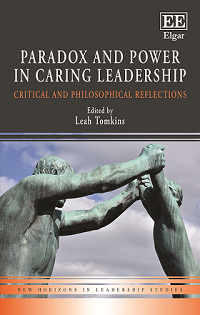What do we really need in a crisis? Caring Leadership
Now, more than at any time in our recent history, we will be judged by our capacity for compassion.
Rishi Sunak
UK Chancellor of the Exchequer, 20th March 2020
In times of crisis, we demand different things from our leaders, organisations and institutions. Crisis situations stir up feelings of helplessness, and reawaken a primal need for nurturing, comfort, strength and guidance. When the world feels unmanageable, we look to leaders in all walks of life to steer us through the crisis and give us explanations for otherwise inexplicable events. Much of this goes on in our unconscious, stirring up feelings over which we have little or no control. This highlights one of the great paradoxes of leadership: Leaders have to appeal to the rational capacities of followers with sensible explanations and logical, ‘evidence-based’ policies, whilst also responding to deep fears and anxieties below the surface which often defy logic.
One of the most primal expectations we have of our leaders is that they should care. If it looks or feels as if our leaders don’t really care – as if they lack compassion for us in our time of need - this can trigger extremely powerful feelings of betrayal and abandonment, and can do lasting damage to our feelings of security and well-being. When we use the expression “s/he just doesn’t care”, we are indicating a very fundamental failure on the part of our leaders. Leaders who offer inadequate care for their subordinates or constituents have a missing chip: they may be brilliant at strategy, outstanding at delivery, but if they do not pass the moral test of care and compassion, they are doomed to disappoint. In times of crisis, this risk is ratcheted up many, many times over.
Mistakes to Avoid
One of the biggest mistakes a leader can make is not showing up in a crisis. By staying away, leaders risk triggering primal fears of rejection and betrayal, especially at a time of uncertainty and fear when there is plenty of space for individual and collective demons to run riot. It is one thing for us to practise ‘social distancing’ in our own daily lives; quite another if we get even the slightest sense that our leaders are ‘socially distancing’ themselves from us.
Caring Leadership in a Crisis: Some Rules of Thumb
There is no single blueprint for caring leadership. Different aspects have been emphasised by a range of writers and thinkers going back thousands of years in history, philosophy and literature. In this video, I consider just three aspects that come to the fore in a crisis from the perspective of caring leadership.
- Everyone reacts differently in a crisis; and we react differently from one day to the next
- The caring leader attempts to find out, not assume, what other people need and want
- The caring leader operates on the goldilocks principle – not caring too much or too little
Find out more about caring leadership in Leah's book
 Paradox and Power in Caring Leadership
Paradox and Power in Caring Leadership
Critical and Philosophical Reflections
New Horizons in Leadership Studies series
Edited by Leah Tomkins, The Open University, UK
Publication Date: 2020 ISBN: 978 1 78897 549 0 Extent: 256 pp
Having leaders who care about us sounds irresistibly appealing. Not surprisingly, therefore, care has been linked to increased organisational commitment and morale amongst employees and other stakeholders. But being, becoming or even working for a caring leader is not straightforward. It is easy to be both too caring and not caring enough, with damaging consequences for both people and their projects.
So, how might caring leaders find that sweet spot between the two extremes in order to care just about enough? Moreover, how can leaders care about their subordinates if they do not like them very much? Do leaders have to genuinely feel nice things about other people or is caring all for show? Does caring help or hinder a leader when s/he has to make tough decisions? When does caring make a leader popular, and when does it tip over into making them unpopular and triggering resentment and anger? And since the roots of care lie in the family and in relations of similarity and kinship, how can caring leadership shake its connections with nepotism and tribalism – a crucial concern for leadership in public life, given the state of our national and international politics?
This book is available to purchase as a hardback or e-book. The introduction and first chapter are available to download free of charge. Visit the publisher's website to find out more.
This sparkling collection puts care where it always should have been – at the forefront of leadership studies. Drawing on a wide variety of perspectives it encourages us to think afresh about why leadership really matters and how it should be practised. It is a gem.
Dennis Tourish
University of Sussex, UK

Upcoming Events
Doing Academia Differently: Professional Development Symposium for Doctoral Students and Early-Career Academics
Tuesday, March 10, 2026 - 09:00 to 17:00
Michael Young Building, The Open University, Walton Hall, Milton Keynes, MK7 6BB
This one-day symposium on ‘Doing Academia Differently’ will provide inspiration and support for PhD and early-career academics to approach the complex tensions and dilemmas of contemporary academia in new and creative ways.
International Women’s Day: Supporting diverse new motherhoods for work inclusion
Thursday, March 12, 2026 - 11:00 to 12:30
Online Webinar - link below
This webinar from our GOP research cluster will discuss findings from research into how motherhood impacts employment for ethnic minority women.